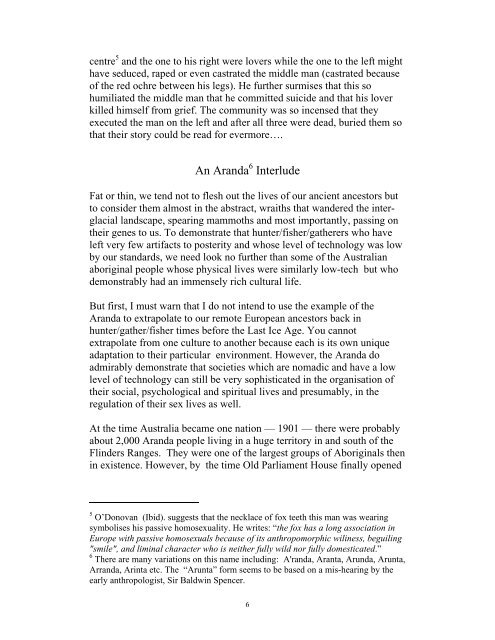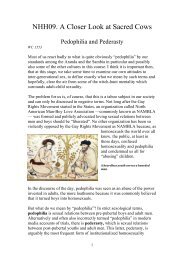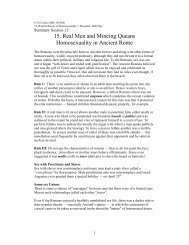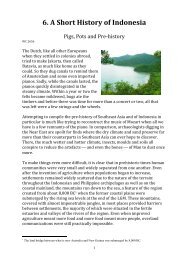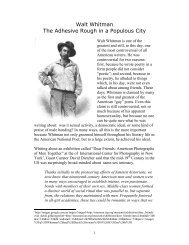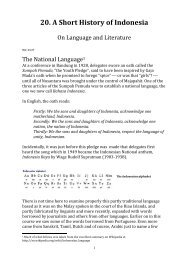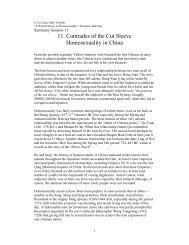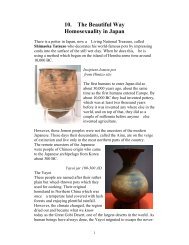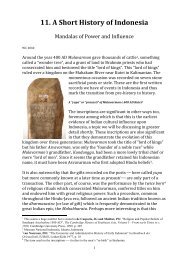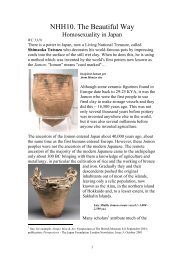7. Boy Wives of the Aranda The Pre-History of ... - BobHay.net
7. Boy Wives of the Aranda The Pre-History of ... - BobHay.net
7. Boy Wives of the Aranda The Pre-History of ... - BobHay.net
Create successful ePaper yourself
Turn your PDF publications into a flip-book with our unique Google optimized e-Paper software.
centre 5 and <strong>the</strong> one to his right were lovers while <strong>the</strong> one to <strong>the</strong> left might<br />
have seduced, raped or even castrated <strong>the</strong> middle man (castrated because<br />
<strong>of</strong> <strong>the</strong> red ochre between his legs). He fur<strong>the</strong>r surmises that this so<br />
humiliated <strong>the</strong> middle man that he committed suicide and that his lover<br />
killed himself from grief. <strong>The</strong> community was so incensed that <strong>the</strong>y<br />
executed <strong>the</strong> man on <strong>the</strong> left and after all three were dead, buried <strong>the</strong>m so<br />
that <strong>the</strong>ir story could be read for evermore….<br />
An <strong>Aranda</strong> 6 Interlude<br />
Fat or thin, we tend not to flesh out <strong>the</strong> lives <strong>of</strong> our ancient ancestors but<br />
to consider <strong>the</strong>m almost in <strong>the</strong> abstract, wraiths that wandered <strong>the</strong> interglacial<br />
landscape, spearing mammoths and most importantly, passing on<br />
<strong>the</strong>ir genes to us. To demonstrate that hunter/fisher/ga<strong>the</strong>rers who have<br />
left very few artifacts to posterity and whose level <strong>of</strong> technology was low<br />
by our standards, we need look no fur<strong>the</strong>r than some <strong>of</strong> <strong>the</strong> Australian<br />
aboriginal people whose physical lives were similarly low-tech but who<br />
demonstrably had an immensely rich cultural life.<br />
But first, I must warn that I do not intend to use <strong>the</strong> example <strong>of</strong> <strong>the</strong><br />
<strong>Aranda</strong> to extrapolate to our remote European ancestors back in<br />
hunter/ga<strong>the</strong>r/fisher times before <strong>the</strong> Last Ice Age. You cannot<br />
extrapolate from one culture to ano<strong>the</strong>r because each is its own unique<br />
adaptation to <strong>the</strong>ir particular environment. However, <strong>the</strong> <strong>Aranda</strong> do<br />
admirably demonstrate that societies which are nomadic and have a low<br />
level <strong>of</strong> technology can still be very sophisticated in <strong>the</strong> organisation <strong>of</strong><br />
<strong>the</strong>ir social, psychological and spiritual lives and presumably, in <strong>the</strong><br />
regulation <strong>of</strong> <strong>the</strong>ir sex lives as well.<br />
At <strong>the</strong> time Australia became one nation — 1901 — <strong>the</strong>re were probably<br />
about 2,000 <strong>Aranda</strong> people living in a huge territory in and south <strong>of</strong> <strong>the</strong><br />
Flinders Ranges. <strong>The</strong>y were one <strong>of</strong> <strong>the</strong> largest groups <strong>of</strong> Aboriginals <strong>the</strong>n<br />
in existence. However, by <strong>the</strong> time Old Parliament House finally opened<br />
5 O’Donovan (Ibid). suggests that <strong>the</strong> necklace <strong>of</strong> fox teeth this man was wearing<br />
symbolises his passive homosexuality. He writes: “<strong>the</strong> fox has a long association in<br />
Europe with passive homosexuals because <strong>of</strong> its anthropomorphic wiliness, beguiling<br />
"smile", and liminal character who is nei<strong>the</strong>r fully wild nor fully domesticated.”<br />
6 <strong>The</strong>re are many variations on this name including: A'randa, Aranta, Arunda, Arunta,<br />
Arranda, Arinta etc. <strong>The</strong> “Arunta” form seems to be based on a mis-hearing by <strong>the</strong><br />
early anthropologist, Sir Baldwin Spencer.<br />
6


